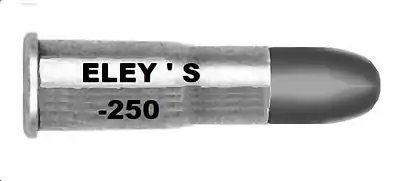.297/250 Rook
The .297/250 Rook is an obsolete centerfire rifle cartridge developed by Holland & Holland.
| .297/250 Rook | ||||||||
|---|---|---|---|---|---|---|---|---|
 | ||||||||
| Type | Rifle | |||||||
| Place of origin | United Kingdom | |||||||
| Production history | ||||||||
| Designer | Holland & Holland | |||||||
| Designed | Pre-1880s | |||||||
| Specifications | ||||||||
| Parent case | .297/230 Morris | |||||||
| Case type | Rimmed, bottleneck | |||||||
| Bullet diameter | .250 in (6.4 mm) | |||||||
| Neck diameter | .267 in (6.8 mm) | |||||||
| Shoulder diameter | .294 in (7.5 mm) | |||||||
| Base diameter | .295 in (7.5 mm) | |||||||
| Rim diameter | .343 in (8.7 mm) | |||||||
| Case length | .83 in (21 mm) | |||||||
| Overall length | 1.1 in (28 mm) | |||||||
| Primer type | Kynoch # 69 | |||||||
| Ballistic performance | ||||||||
| ||||||||
| Source(s): Cartridges of the World,[1] & Modern sporting gunnery.[2] | ||||||||
Overview
The .297/250 Rook is a bottlenecked rimmed cartridge originally designed for use in rook rifles for hunting small game and target shooting.[1]
This cartridge was introduced by Holland & Holland some time before 1880 by blowing out the neck of the .297/230 Morris Long to .250 in (6.4 mm).[3] This cartridge is a contemporary of the .255 Jeffery Rook and upon their release the pair competed heavily with the very popular .300 Rook.[4]
As with other rook rifle cartridges, the .297/250 Rook was superseded by the .22 Long Rifle.[5]

Eley's .297/250 Rook rifle cartridge.
Dimensions

References
Footnotes
- Barnes.
- Sharp.
- Imperial War Museums, ".297/250 Rook".
- Imperial War Museums, ".300 Rook".
- Cartridgecollector.
Bibliography
- Barnes, Frank C., Cartridges of the World, 15th ed, Iola: Gun Digest Books, 2016, ISBN 978-1-4402-4642-5.
- Cartridgecollector, ".300 Rook target", cartridgecollector.net, retrieved 22 April 2017.
- Imperial War Museums, "6.35 x 20.5R : Kynoch ; .297/.250 Rook Rifle", iwm.org.uk, retrieved 22 April 2017.
- Imperial War Museums, "7.62 x 29.5R : Kynoch ; .300 Rook Rifle & .295 Rook Rifle", iwm.org.uk, retrieved 22 April 2017.
- Sharp, Henry, Modern sporting gunnery: A manual of practical information for shooters of today, London: Simpkin, Marshall, Hamilton, Kent & Co. Ltd, 1906.
External links
- Ammo-One, ".297/250 Rook", ammo-one.com Archived 2021-05-03 at the Wayback Machine, retrieved 22 April 2017.
- Cartridgecollector, "297/250 Rook Rifle", cartridgecollector.net, retrieved 22 April 2017.
This article is issued from Wikipedia. The text is licensed under Creative Commons - Attribution - Sharealike. Additional terms may apply for the media files.